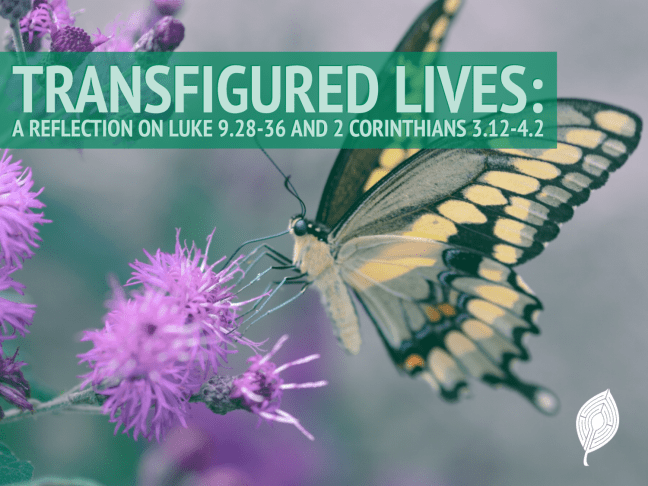Today marks the last Sunday before the start of Lent. It’s therefore also the end of a wonderfully leisurely season after Epiphany (because a late Easter has given us two extra weeks before Lent this year). Today also marks the fourth day of the Russian invasion of Ukraine, an event which has further destabilized a world that was already teetering. And so, there are a few strands competing for my attention today: Looking back at the season of Epiphany in which to basked in the light of Jesus’ teaching and the radical ways it calls us to live; Looking ahead to the season of Lent, in which we turn that divine light in on our own hearts in repentance; and Looking at the apparent darkness of our present moment, marked as it is by political and social strife at home and the war in Eastern Europe. At this moment of change in the liturgical year and crisis in the world at large, today’s Gospel reading, recounting the Transfiguration, seems particularly striking.
The Transfiguration marks the pinnacle of Jesus’ ministry. From his Baptism until now, he has been healing, performing miracles of abundance (e.g., the Wedding at Cana, the feeding of the five thousand, and the multitude of fish), and teaching the beautiful, hard sayings of life in the Kingdom of God. Peter has confessed Jesus as the Messiah and Jesus has predicted his death. And it is now that Jesus takes Peter, James, and John up onto the mountain to pray and they witness his Transfiguration. Everything has built up to this moment. If we think of Luke as having three Big Moments, with the Nativity at the beginning and the Resurrection at the end, the Transfiguration is the one in the middle of the story, the culmination of everything that has gone before and the beginning of everything that comes after.
While it’s a relatively new development in the lectionary, the Transfiguration is an apt reading with which to end the season after Epiphany. Epiphany, of course, means ‘revelation’, or ‘shining out’. And so it’s an appropriate name for this time of the year when we recall all the ways God is revealed in and through Jesus. God shone through Jesus at his birth. God shone through Jesus at his baptism and temptation in the desert. God shone through Jesus when he accepted the mission of Isaiah 61 as his own. And, God shone through Jesus in the Beatitudes and parables of the Kingdom. What was once hidden behind veils or shone dimly through the cracks of human life and effort, shone out in Jesus fully. Jesus was always shining with the glory of God. This is why the Church has considered the Transfiguration to be a miracle of sight for the disciples rather than something that ‘happened’ to Jesus. Jesus was always shining with the glory of God; it’s just that the disciples have only now been given the gift of seeing it.
This brings us to the words of today’s Epistle, in which Paul picks up on this theme of revelation in Jesus:
Since, then, we have such a hope, we act with great boldness, not like Moses, who put a veil over his face to keep the people of Israel from gazing at the end of the glory that was being set aside. … [W]hen one turns to the Lord, the veil is removed. Now the Lord is the Spirit, and where the Spirit of the Lord is, there is freedom. And all of us, with unveiled faces, seeing the glory of the Lord as though reflected in a mirror, are being transformed into the same image from one degree of glory to another; for this comes from the Lord, the Spirit. Therefore, since it is by God’s mercy that we are engaged in this ministry, we do not lose heart. We have renounced the shameful things that one hides; we refuse to practise cunning or to falsify God’s word; but by the open statement of the truth we commend ourselves to the conscience of everyone in the sight of God. (2 Corinthians 3.12-4.2)
Again, the teaching here is that Jesus’ life and ministry have pulled off the veil from the glory of God. What we were once able to see only dimly we are now able to see clearly. Paul calls this ‘freedom’ — not a libertarian freedom to do whatever we want, but the true freedom that is to see God as God is, to see ourselves as we are, and the world as it is. This kind of freedom is not for the faint of heart! This freedom doesn’t leave us as we are, but initiates a profound transformation from within, so that we too may shine with God’s glory as Jesus did.
And that’s the whole point of this thing we call Christianity. It is not a set of beliefs to adhere to. It is not a set of rituals to perform. It is not an authority or call to remake the world in our image. It is certainly not about earthly power or national pride. It is the call to renounce all political commitments as secondary at best, and to be remade in the image and likeness of Christ and to shine out with his love in the world.
This is an evergreen message, as true and relevant in good times and bad, in peace and in war, in prosperity and in poverty, in stability and in uncertainty. And so, as we transition this week, in these uncertain and frightening times, from Epiphany to Lent, from the season of revelation to the season of repentance, may we all hold fast to this truth, not losing heart, but persevering in faith, commending ourselves to the conscience of everyone in the sight of God.
Amen.


2 thoughts on “Transfigured Lives: A Reflection on Luke 9.28-36 and 2 Corinthians 3.12-4.2”